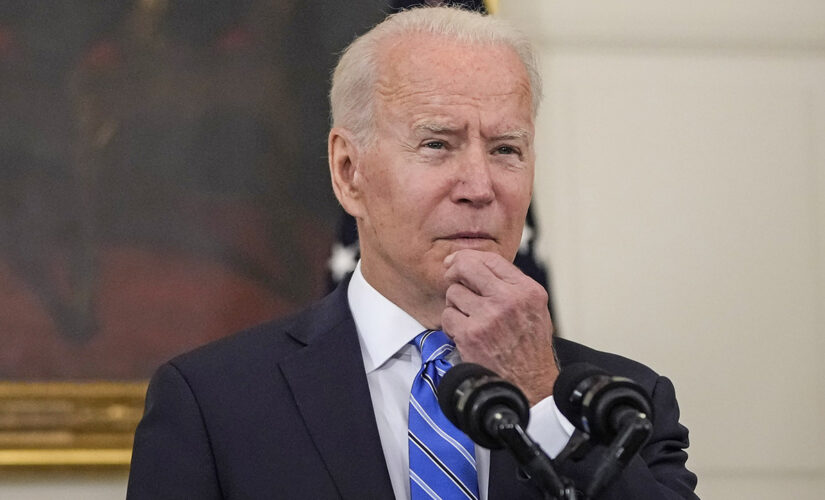NEWYou can now listen to Fox News articles!
FIRST ON FOX: The Environmental Protection Agency (EPA) spent $7 million in funds from President Biden’s $1.9 trillion COVID-19 relief package on a program to replace diesel school buses with electric ones in underserved communities.
The EPA’s 2021 American Rescue Plan (ARP) Electric School Bus Rebates program allocated $7 million in funds from Biden’s American Rescue Plan Act to schools to replace up to four diesel buses with electric school buses totaling $1.2 million or $300,000 each.
EPA USED COVID-19 RELIEF FUNDS FOR GRANTS PROMOTING ‘GREEN INFRASTRUCTURE,’ ‘ENVIRONMENTAL JUSTICE’
According to the EPA, the ARP appropriated funds to the EPA are specifically for “activities that identify and address disproportionate environmental or public health harms and risks in minority populations or low-income populations.”
U.S. President Joe Biden speaks about the nation’s economic recovery amid the COVID-19 pandemic in the State Dining Room of the White House on July 19, 2021 in Washington, DC.
(Photo by Drew Angerer/Getty Images)
The school bus rebates program was tailored only to applicants in underserved school districts, tribal schools, and private fleets serving those schools, and the replacement buses had to be electric, according to the EPA. The approved schools, which were selected through a lottery, have until October to show that they’ve purchased the new buses and scrapped the old ones.
A webinar for applicants to the program, which was released last October, said, “Diesel engines emit harmful nitrogen oxides (NOx), particulate matter (PM), and other pollutants,” and that “while new buses must meet EPA’s tougher emission standards, many older school buses continue to emit harmful diesel exhaust.”
In total, the program awarded funding for 23 electric school bus replacements and associated charging infrastructure at 11 different schools across the country. At $300,000 per bus, the EPA was left with $100,000 in leftover ARP funds, which the agency told Fox News Digital will be allocated “properly to another program or department” after consulting with its budgetary staff.
The U.S. Environmental Protection Agency’s (EPA) logo is displayed on a door at its headquarters on March 16, 2017 in Washington, DC.
( Justin Sullivan/Getty Images)
“The science shows a clear link between air pollution and the public health impacts of respiratory illnesses such as COVID-19,” the EPA said in a statement to Fox News Digital. “Electric school buses provide cleaner air for children, school bus drivers, and the community.
“EPA delivers cleaner air using the Diesel Emissions Reduction Act (DERA) program which allows school districts to replace diesel engine buses with electric school buses along with other cleaner alternatives,” it continued. “Through the American Rescue Plan (ARP), Congress provided additional funding to EPA’s DERA program to address public health concerns in low-income and minority populations which bear a disproportionate burden of air pollution. The ARP funding provided to EPA’s DERA program is reserved exclusively for school districts in underserved communities, Tribal schools, and private fleets serving those schools while the annual DERA program is open to all eligible states.”
A school bus sits parked in Columbus, N.M., on Sunday, April 11, 2021.
(Bill Clark/CQ-Roll Call, Inc via Getty Images)
Vice President Kamala Harris celebrated the EPA program during a White House event in March announcing the rebate winners.
“Imagine a future: The freight trucks that deliver bread and milk to our grocery store shelves and the buses that take children to school and parents to work; imagine all the heavy-duty vehicles that keep our supply lines strong and allow our economy to grow — imagine that they produced zero emissions,” Harris said March 7. “Well, you all imagined it. That’s why we’re here today — because we have the ability to see what can be, unburdened by what has been, and then to make the possible actually happen.”
The American Rescue Plan (ARP) Act, which the Democrats passed in March 2021 without any Republican support, was billed by the Democratic Party as a necessity for reopening schools during the COVID-19 pandemic.
Before an audience of nine families that are benefiting from the new Child Tax Credit, U.S. President Joe Biden and Vice President Kamala Harris deliver remarks on the day tens of millions of parents will get their first monthly payments in the South Court Auditorium in the Eisenhower Executive Office Building on July 15, 2021 in Washington, DC.
(Photo by Chip Somodevilla/Getty Images)
Democrats like Sen. Raphael Warnock, D-Ga., described the passing of ARP as a matter of life and death.
“This is one moment in which it’s very clear that public policy is quite literally a matter of life and death,” Warnock said during a February 2021 news conference with Sen. Chuck Schumer, D-N.Y., adding that the bill would provide “more than $4 billion to the state of Georgia’s K through 12 schools to ensure students, teachers, and staff stay safe and healthy, and to address learning loss.”
But the ARP is facing intensifying scrutiny for its effect on the U.S. economy after inflation rose a stunning 8.5% last month. Some economists, including former Obama administration economic advisers, have blamed the $1.9 COVID-19 relief package for overheating the economy.
CLICK HERE TO GET THE FOX NEWS APP
Fox News Digital reported last month that blue states across the country are using billions of taxpayer dollars from the ARP to push core tenets of critical race theory (CRT) in public schools.
Meanwhile, the EPA used $5.25 million allocated from the ARP last year for an environmental justice program that funded grants for projects that had virtually little to do with addressing COVID-19 or the effects of the pandemic, including a nonprofit that uses “storytelling” and “tree walks” to “increase awareness and dialogue surrounding inequitable tree canopy cover.”




